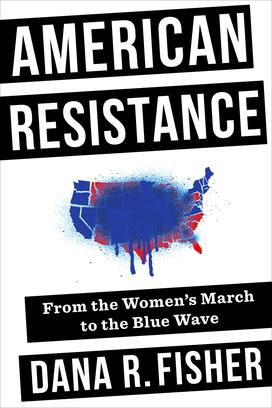Dana R. Fisher ’93 Studies Grassroots Activism and the Blue Wave

The book: In the days since Donald Trump’s election, a grassroots movement has grown into a full-fledged “Resistance.” Dana R. Fisher ’93 traces the paths of activists from demonstrations like the Women’s March back to their local communities where the Resistance organized and provided practical, democratic outlets for outrage.
Supported by data collected from surveys in the field and interviews, Fisher narrows in on the ways grassroots activity and Resistance groups that started for specific reasons—such as the Women’s March—redirected their focus on midterm elections and turning congressional districts blue. American Resistance: From the Women’s March to the Blue Wave (Columbia University Press) analyzes the impact of the grassroots Resistance on the 2018 midterm elections, studies activists’ motivation in their own words, and looks ahead to the 2020 presidential election.
The author: Dana R. Fisher ’93 is a professor of sociology at the University of Maryland, College Park. Her books include Activism, Inc: How the Outsourcing of Grassroots Campaigns is Strangling Progressive Politics in America (Stanford University Press). Her research focuses on understanding the relationship between environmentalism and democracy—most recently studying activism and American climate politics. Her research employs a mixed-methods approach that integrates data collected through semi-structured interviews and participant observation with various forms of survey data.
Opening lines: In September of 2018, former president Barack Obama addressed a crowd at the University of Illinois at Urbana-Champaign. After months of living outside the political limelight and taking time off to be with his family and to kitesurf with Richard Branson, the former president reentered public life before the midterm elections. Standing at the podium dressed in black and with a bit more gray around his ears, Obama announced:
I’m here today because this is one of those pivotal moments when every one of us, as citizens of the United States, need[s] to determine just who it is that we are, just what it is that we stand for. And as a fellow citizen, not as an ex-president, but as a fellow citizen, I am here to deliver a simple message, and that is that you need to vote because our democracy depends on it. . . . The best way to protest is to vote.
Although eloquently delivered, the former president’s words were not particularly unique. A month later, during a conversation with Victoria Kaplan, the organizing director at MoveOn, I heard about all the ways her group was working to channel the outrage of the people marching in the streets into political action around the midterm elections. She expanded on Obama’s address without even realizing it: “You can’t just march and think that things are going to change. We march and we organize, and we vote.”
Reviews: “American Resistance charts the course of ten anti-Trump surge in activism and organizing, shedding light on crucial realities and busting myths along the way. This is a must-read for anyone who wants to understand the people-powered movements that are changing American politics in the Trump era.” — Leah Greenberg, co-executive director, Indivisible












1 Response
Norman Ravitch *62
6 Years AgoA Utopian Idea
Getting rid of Trump through grass-roots organizing seems utopian to me. The only sound way is to prosecute him for his crimes: This is not utopian, but realistic.